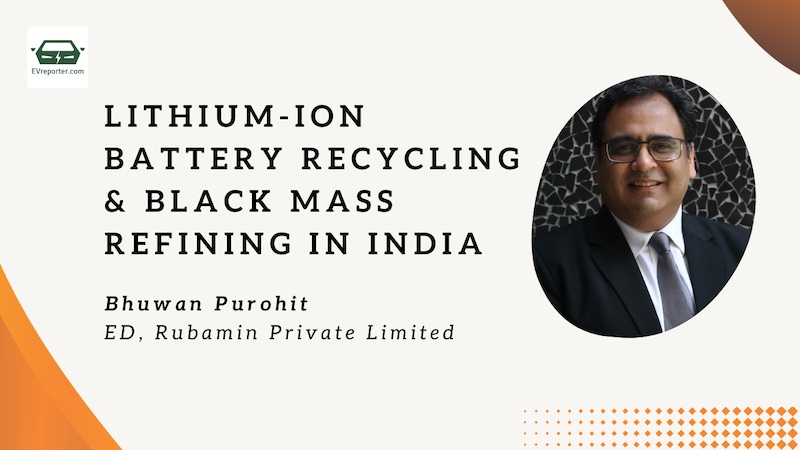Building large scale hydrometallurgy operations to extract battery materials | Chat with Bhuwan Purohit – Rubamin

Rubamin Pvt Ltd has been transforming hazardous industrial waste into useful chemicals for over three decades. They are now aggressively working on a large-scale circular economy project to extract critical battery materials from used lithium-ion battery (LIB) packs. This interview with Mr Bhuwan Purohit – Executive Director, discusses their business outlook and recycling plans.
Can you please tell us about Rubamin’s industrial waste recycling business and plans for LIB recycling?
As a company, Rubamin started 40 years ago with recycling, and it adopted the extraction process about 30 years back. We have been treating hazardous waste coming out of multiple Industrial processes. The key metals we work on include zinc, molybdenum, tungsten, vanadium, cobalt, nickel, and copper. However, copper is not from the industrial source as of now.
Now, we are moving into lithium-ion recycling by using waste batteries or battery black mass as input to our extraction process.
For this, we have an INR 525 crores of investment planned, to start refining 5,000 TPA of battery black mass come July 2024.
There are plans beyond that, but they haven’t been crystallized yet. We are awaiting the results from the first plant with respect to the products, yields and costs at which we can do this.
What prompted you to enter LIB recycling? What kind of synergies do you derive from your existing operations?
We have been doing nickel, cobalt, and manganese for decades. Our search for Cobalt-rich secondary material led us to LIB black mass, which further led us to the lithium-ion battery.
There is a lot of synergy with our existing operations. We are adopting solvent extraction as the key method to extract all the metals in the battery black mass. We have been in R&D for almost 25 years and have a large team of scientists working on the hydrometallurgy process.
There are the people, the process, and the infrastructure we have built over so many years. We also have the approvals, the customer base and the history of being a responsible recycler. I think all these aspects give us an edge as we enter this new business for battery recycling.
Can you tell us about Kilo Lab – your demo plat for LIB recycling?
Interestingly, the KiloLab was sanctioned after our board had already approved the LIB recycling project. Not many international and Indian players were willing to believe that an Indian company could extract metals with high purity without waste. So, we decided to have a small plant in action, and it’s already running.
We are submitting our material samples from this plant to large battery and electronics companies to hasten the customer qualification processes. By the time the full-scale plant is up in July next year, we expect to be in a good state to go ahead and let the business roll.
How does Rubamin’s proprietary hydrometallurgy process minimize waste and make the operations environmentally sustainable?
Hydrometallurgy is a complex, resource-intensive process, but over time, with research, practice and experience, we have been able to minimize or, to a great extent, eradicate the impact on the waste side. Rubamin has a 65-acre green recycling complex in Halol, Gujarat; we have zero waste from that plant. Nothing is going to landfill, and there is zero liquid discharge. The existing operations where we treat other industrial waste are already more than 30 per cent circular.
We have a World Business Council of Sustainable Development’s circular transitory indicator score of 30%. In terms of the quantum of material that comes into a plant, 30 per cent goes back to the same supply chain, making the operation circular.
Rubamin aims to become completely independent of river water or groundwater. The dream is to eradicate 100,000 tons of hazardous toxic waste from the country with zero waste, zero water and renewable power in a finite time frame.
Most Indian companies involved in end-of-life LIB management of spent batteries export the black mass. What factors prohibit companies from entering the next stage, which is metal extraction?
- Black mass refining is very capital-intensive. A typical battery shredding unit for 10,000 tons of battery would cost you anywhere from a couple of crores to 15 crores INR. However, setting up a hydrometallurgy unit to extract metals from that 10,000 tons of battery will cost you between 400 and 600 crores INR. So, we are talking about a hefty investment and a huge land footprint.
- Another critical part is the technology because only extracting those metals is not enough. You must convert them into usable products, such as chemicals or high-purity metals. Meeting the qualification criteria of a cell manufacturer or a sensitive industrial customer is challenging. So, technology is one of the big deterrents.
- Another factor is the environmental challenge this process brings. Unless you are adept at the technology, hazardous waste will always come out of the units, which must be dealt with. So, these are the key challenges that stop people from investing in refining capabilities.
Are you also going to do the shredding part as well?
Our initial thought was to start with the black mass. After studying the industry closely, we have realised that our customers want to have a one-stop shop, a clear view of their material, and to have it responsibly treated.
We have decided that as we advance, we will also do the mechanical separation or disassembly. These operations for 10,000 tons of lithium-ion battery shredding will be built parallelly.
What kind of customer base do you expect to find in India for the extracted metals, your end product?
We would want to serve the Indian market completely. The government in India has made some very positive investments towards incentivizing the demand side. EV sales are picking up. Units are coming alive for advanced chemistry cell production in the country. We expect to have a lot more investment going into the battery segment. With the Government’s focus on ensuring domestic value addition, I expect to have all our customers from India. We will be able to service their demand for critical metal-based compounds.
How would the extracted metals compare with virgin materials?
Rubamin currently recycles over 20,000 tons of spent oil catalysts from refineries. We extract molybdenum, tungsten, vanadium, cobalt and nickel and send them back to catalyst producers, who are (if not more) equally sensitive to purity profiles and physical parameters, whether it is the
morphology, the surface areas or the bulk density of the product. For years, we have been selling the extracted material against virgin competition.
Responsible companies need recycled products as part of their supply chain and are willing to give a premium. Rubamin gets premium for its products because they are not only green, but they’re equally good in quality compared to any primary product.
The same logic extends to the battery materials. Our kilo lab is already submitting extracted metal samples to companies, and they are finding the product high-quality. If the product is not as good as the primary, you can’t sell it. You must provide top-class products, and our process can do that.
What kind of policy support will help the companies set up large-scale operations for LIB recycling?
- Responsible recycling – You cannot have unscrupulous players enter the segment. We must curb them immediately if we want to see serious players, quality material, circularity and zero waste. The CPCB and MoEF have declared the waste from the used batteries hazardous and must be treated accordingly. We only expect the law to be implemented in all its true meaning and spirit.
- Supply-side challenge – In a new industry, there is always a timeline mismatch between when the supply side becomes strong and when the market demand becomes strong. This gap needs to be patched up so that businesses feel secure and they can invest the right amount of money. While the waste batteries and the waste coming out of the shredding have been regarded as hazardous, the import of black mass and used batteries must be permitted to authorized recyclers to prevent this gap in the supply chain. The black mass and used batteries are the new urban mining resources. The government has already recognized the critical metals in its policy, and I recommend that imports be allowed to the authorised, zero waste, and circular units.
This interaction is available on YouTube and was first published in EVreporter Dec 2023 magaizne.
Subscribe today for free and stay on top of latest developments in EV domain.







Pingback: BatX Energies raises $5 Million in Pre-Series A round led by Zephyr Peacock • EVreporter